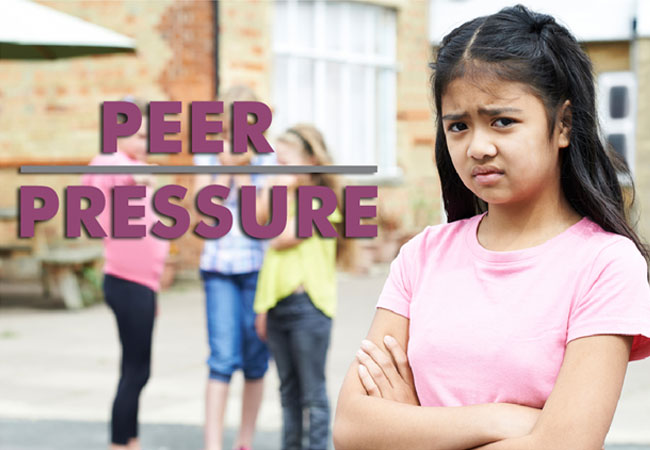
In the classic novel To Kill a Mockingbird, Scout tells her father Atticus that she used a racial slur because it’s “what everybody else at school says” to which he replies, “from now on, it’ll be everybody less one”.
Wanting to ‘fit in’ and be accepted by their peers is a powerful motivator for children to indulge in inappropriate, illegal, and sometimes even dangerous behaviour. Cheating in exams, shoplifting, vandalizing public property, smoking and doing drugs, consuming alcohol, taking part in bullying or eve-teasing, having sex, etc. are all activities that are undertaken by the youth who want to fit in with the crowd and become popular. If these activities go undetected by the parents, the children’s lives could go on a downward spiral and studies could go for a toss. That is why, it is important to look out for concerning behaviours by children and teach them about peer pressure and how to overcome it. Here are a few ways that how you, as a parent, can help your child deal with peer pressure:
1) Don’t Overreact
When your child talks to you about school and what his or her friends are doing, you may hear some upsetting things. At such times it is important not to yell, blame, or lecture your child. Instead, stay calm and don’t jump to conclusions. Try to get your child to think about the consequences of risky behaviour by asking questions such as, “I wonder if your friend realizes that she could get arrested for underagedrinking.”
2) Invite Friends Over
Ask your child to call friends over for lunch, dinner or a sleepover. Use the time getting to know his or her peers and whether or not they’re a good influence on your child. If you feel that they have a negative influence on your child, you know you need to talk to your child about it soon. However, be sure to choose the right time and the right words while doing so. Be very sensitive about your child’s feelings towards his or her friends.
3) Set Family Rules
Set certain family rules and imbibe them in your child. Household rules such as “in this family, we are all kind to each other” teaches your child about kindness and how being mean or rude is not appreciated by anybody. So, the child will not succumb to peer pressure about teasing a fellow classmate. Other examples of setting family rules are – “we don’t hurt each other”, “we always tell the truth”, “we stand up for each other”, etc.
4) Have A Heart-To-Heart Talk

Sit down and have a heart-to-heart talk with your child. Help your child understand about what makes a true friend. For instance, someone who makes you feel good about yourself, supports and encourages you to make good choices and helps you in times of need is a good friend whereas someone who deliberately tries to involve you in hurtful, dangerous and illegal activities is not a good friend. Encourage your child to evaluate his or her friends and consciously choose a friend circle that doesn’t make him or her feel bad about anything. You can also discuss with your child what independence really means – if your child longs for independence, then other children should not be making decisions for him or her as that’s not independence! Additionally, discuss with your child about the responsibilities that accompany independence. It is also important to discuss dangerous behaviour. This also solves most common teenage problems Presenting facts about the effects of drugs, smokes and alcohol will help them make a more informed decision when tempted to try them. You can also talk about the dangers of travelling alone at night and of trying ‘stunts’ because they look fun.
5) Teach Them Effective Responses
If your child is not prepared for how to respond to peer pressure, it’s likely that he or she will react too quickly and give in to the pressure. Certain strategies you can discuss with your child are mentioned below –
-
- Stop and Think – Teach your child to take a moment to stop and think before responding to peer pressure. What will be the consequences of indulging in the behaviour? Will somebody get hurt? Can they be expelled from school? Will they be breaking any law? Allowing themselves time to contemplate the results of their actions will help them make the right decision about giving in to the pressure.
- Say No – Tell your child ‘no’. When you clearly set limits and use sentences like “No, I am not okay with that”, you are teaching your child the vocabulary and the notion that even he or she can use such sentences with peers. You can also teach your child to become more assertive by helping him or her practice saying ‘no’ and thinking of some casual reasons to go along with it. For example, if someone offers a drink, your child could say – “Are you kidding? If my mom finds out I’m drinking, she will kill me” or “No thanks, I have a karate tournament coming up next week and I’m training” or simply, “Thanks, but no thanks.”
Sit with your child and identify possible peer pressure situations your child may face. Practice speaking assertive sentences and ways on how to get out of those situations. - Walk Away – Walking away from a situation is the only solution if your child finds that his or her friends are determined to do something risky or mean. However, it is important that your child learns how to walk away correctly. Shouting will only lead to a fight between friends. Instead, teach your child to think creatively and say things like “OK, I’m going home to play video games. If you change your mind, come over” or “I swear I’ll get in trouble if I don’t finish reading this by tomorrow so I’m going to go over there and sit”. Teach your child to ask you or the teachers at school to help walk away from a situation.
- Provide Another Option – Instead of blatantly saying no to friends, your child can offer another option instead, such as “Why don’t we go to the cinema and watch xyz movie instead? I heard it’s amazing!” or “I heard xyz restaurant serves the best pizza around here. Wanna go check it out?”
- Use Humour – If your child is naturally witty and humorous, suggest making jokes in high pressure situations in order to deflect the conversation without offending anyone. This will not only help change the topic and prevent your child from having to say no clearly, but will also help keep conversations light-hearted.
- Listen to The Gut – Tell your child to listen to his or her natural instinct or gut feeling. Even if everyone else seems okay with what’s going on, it means something about the situation is not right for your child and that he or she needs to walk away from the situation immediately.
- Use Confrontation – Encourage your child to have an honest and direct conversation with the person or people who are trying to pressurize him or her. It’s a good idea to rehearse exactly what your child will be saying and to choose the right time and place to do so.
6) Agree on a Bailout Phrase
-
- Agree with your child on a bailout phrase to use incase the situation becomes too difficult to come out of. One could be your child calling you up and saying – “Hey mom, can you pick me up? I have a terrible headache” another could be- “Oh no! I completely forgot about that. I’m on my way.”
-
- Peer pressure is not a phenomenon that only affects children and teens. Even adults are subjected to it from time to time and end up making poor life choices if they were not able to resist it. That is why, it is necessary to teach our children the right tactics to dealing with peer pressure from a very early age so that they can grow up to become mature, responsible and assertive adults.
- So, encourage your child to come and talk to you every time peer pressure got the best of him or her and encourage your child to also tell you whenever he or she made an active choice against succumbing to peer pressure. Acknowledge and reward your child for telling you the truth and also for making a healthy choice


 Users Today : 165
Users Today : 165 Total views : 464717
Total views : 464717